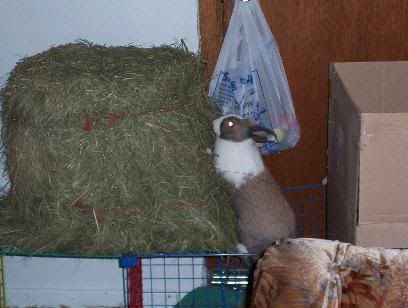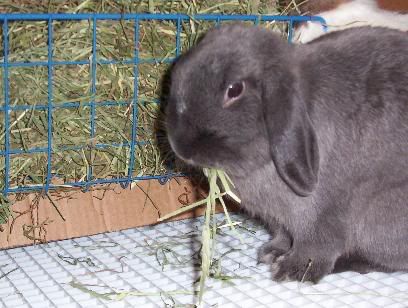 Our furry friends are not so very different from their wild european ancestors, whom spend much of their day grazing on wild grasses. Just like their distant cousins, our own bunnies also require the long grass hays to keep their own gut motility operating in peak condition. With your bunny feeding on dried grass hays continuously throughout the day you will be taking preventative measures against a host of common health issues. One often fatal health concern for rabbits is fur block. When your rabbit grooms himself, any loose or moulted fur will be picked up and injested. All injested fur then has to pass through his intestinal tract, along with his daily foods. If he does not have sufficient grass hay intake the fur will tend to gather in his intestines, forming into an impaction, or what is commonly known as a "Hairball". If the hair is not expelled this matted, wet mass will continue to build, until his intestines become completely blocked. A rabbit in this condition is in extreme risk of losing his life, and must be taken to a rabbit savy vet immediately. If your rabbit has progressed to this point of impaction, it is quite common that the only chance for your vet to save your beloved friend is to operate to remove the blockage. Operations on rabbits can be difficult due to their extremely delicate systems. As operating on a rabbit is so tricky it will not always ensure that your rabbit will survive. You can greatly reduce the risk of your rabbit ever forming a fur blockage by supplying your rabbit with unlimited grass hays. The movement of the long fibers of the grass hay passing along the digestive tract help to pull the fur out and through your rabbit. Evidence that your rabbit is eating enough grass hay daily can be witnessed via their output... or feces. When you see multiple poops strung together by strands of hair (pictured right) you can generally rest assured that your rabbit is complely passing his injested fur.
Our furry friends are not so very different from their wild european ancestors, whom spend much of their day grazing on wild grasses. Just like their distant cousins, our own bunnies also require the long grass hays to keep their own gut motility operating in peak condition. With your bunny feeding on dried grass hays continuously throughout the day you will be taking preventative measures against a host of common health issues. One often fatal health concern for rabbits is fur block. When your rabbit grooms himself, any loose or moulted fur will be picked up and injested. All injested fur then has to pass through his intestinal tract, along with his daily foods. If he does not have sufficient grass hay intake the fur will tend to gather in his intestines, forming into an impaction, or what is commonly known as a "Hairball". If the hair is not expelled this matted, wet mass will continue to build, until his intestines become completely blocked. A rabbit in this condition is in extreme risk of losing his life, and must be taken to a rabbit savy vet immediately. If your rabbit has progressed to this point of impaction, it is quite common that the only chance for your vet to save your beloved friend is to operate to remove the blockage. Operations on rabbits can be difficult due to their extremely delicate systems. As operating on a rabbit is so tricky it will not always ensure that your rabbit will survive. You can greatly reduce the risk of your rabbit ever forming a fur blockage by supplying your rabbit with unlimited grass hays. The movement of the long fibers of the grass hay passing along the digestive tract help to pull the fur out and through your rabbit. Evidence that your rabbit is eating enough grass hay daily can be witnessed via their output... or feces. When you see multiple poops strung together by strands of hair (pictured right) you can generally rest assured that your rabbit is complely passing his injested fur. These stands will not always be present, but should be witnessed during times of molt.
These stands will not always be present, but should be witnessed during times of molt.
It is not unusual for you to find that you are allergic to some grass hays. Timmothy is one that many of my own friends have discovered an allergy to. But the good news is that there are several types of grass hays available for your purchase. Some types include: Alfalfa, Timmothy, Brome, Oat and Orchard. Although alfalfa hay is essential to the nursing or young, growing rabbit, it should be avoided after he has reached 6 months of age. This is because the alfalfa is a legume hay which contains too much calcium and protein, and can lead to bladder and kidney problems. Not only does it contain a high level of calcium and protein compared to other grass hays, but it also contains the lowest amount of crude fiber among all hays. It is a high level of fiber that you should be striving to reach... so once your bunny reaches adulthood, make a gradual transition from alfalfa over to another hay such as timmothy.
Grass hay also has the added benefit of wearing down your rabbits ever-growing teeth. A rabbit's teeth grow continuously throughout his life, and if he is not busy chewing hay (and other acceptable chewables) then his teeth may quickly become overgrown. Overgrown teeth result in another slew of problems... such as "Malocclusion", or mis-aligned teeth. Even having your veterinarian trim your rabbit's teeth can put them out of alignment. Please read the article Keeping your rabbits teeth healthy by Pet Place for an explanation of the dangers involved with Malocclusion.
When you make hay available to your little hoppers, you will be providing them with hours of chewing entertainment. It is well known that rabbits love to chew. Grass hay is an excellent alternative to your beloved wooden furnishings. You can purchase on-line, grass or straw mats... which are thin square mats, woven out of blades of grass or straw. These also provide excellent chewing deterents, as do items made of untreated wicker or grape vine, such as baskets and wreaths. Explore the possibilities... your rabbit will thank you for it!
Lastly, I would like to encourage all of you to have one day each week as a "hay only" day. On this day your rabbit should receive only hay and water, and all other foods; treats, vegetables & fruits, should be completely withheld. Many nutritionists beleive that even for human beings, taking a day to fast from heavy foods and give your digestive tract a break from the labour of digestion is very beneficial to removing any debris that has accumulated over time. I believe this to be true not only for ourselves, but also for our furries... and practice a weekly "hay only" day with my own rabbits. You may worry that your rabbit will starve if his pellets are withheld, but please let me assure you so long as he has unlimited hay available to him you are doing what is in his best interest. I have been practicing a weekly "hay only" day for the last three years, and I have not had any problems with accumulated fur in the tummy, or anybun keeling over from starvation. Since rabbits are incredibly attracted to sweets, and will prefer their pellets and vegetables to hay (generally speaking) their own hunger will entice them to increase the volume of hay that they injest. If your rabbit is not particularly fond of his hay, you can encourage him to eat more by limiting his other foods, as well as by trying other types of grass hays. I wish you all, happy healthy tummies.